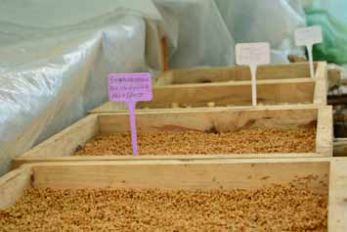
The seed bank under the Lamjingshai CLF in Khweng village in the Ri Bhoi district of Meghalaya is one of the more successful examples of Seed Banks and is a model seed bank for Khasi and Jaintia Hills. This CLF was started under the erstwhile Meghalaya Rural Development Society (MRDS) and is one of the leading Cluster Level Federations in the state of Meghalaya. It was formed on September 28th, 2008 and includes 22 SHGs from 6 Villages. This CLF has about 200 members, with 175 of them being females. The sustained success of Lamjingshai CLF has been critical to the overall development of Khweng Village. Like with the CLF’s other activities, its Seed Bank too has become a model whose best practices are being replicated at sites across the state. In fact, Khweng was one of the village communities hosting the International Terra Madre event (that was held in Shillong and in villages across Meghalaya from the 3rd to the 7th of November, 2015). Its community showcasing to national and international delegates its successful livelihood and biodiversity preservation activities as well as its ancient culinary traditions. In December 2014, the CLF and the IBDLP programme implementation team met for an initial discussion on the concept of a seed bank and community nursery. The Lamjingshai CLF then decided to take up the Seed Bank in social enterprise as planned under IBDLP. Officials from MBDA came to Khweng to help CLF members in land and site selection. Three CLF members were sent to Bangalore for training so as to become master trainers. These master trainers also received training on techniques for making compost, Panchagavya and vegetable enzymes. Master trainers then provided training to other CLF members as well.
OPERATIONAL DETAILS
All 22 SHGs forming the CLF participate equally in this social enterprise and a labour register is regularly maintained. At least 2 to 3 members from each SHG work at the seed bank on a regular basis. The members who work at the seed bank are paid Rs. 153.00 while Rs. 97.00 is deposited into the common CLF fund. The CLF holds meetings once every month for coordination and decision-making. The CLF and MBDA have entered into a 3 Year Social Agreement that notes responsibilities of both parties during this period, and the expected outcomes regarding sustainability etc. of the Seed Bank at the end of this initial handholding period. MBDA helps the CLF by providing technical knowledge on seed and seedling care, and physical inputs such as a poly-house, nets, seed trays and various other paraphernalia. While MBDA also acts as a seed provider, most seed varieties at this Seed Bank come from within and around the village itself. According to the Seed Bank model under IBDLP, if the community starts earning net revenue at the end of the social agreement period, the money is deposited into the CLF fund and becomes available for use by members for various CLF or individual activities.